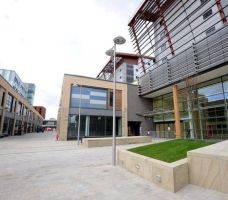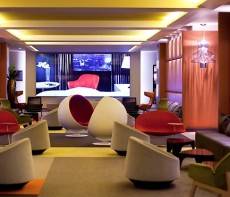September 8, 2014
Overdevelopment leads to bad building design, claim Carbuncle Cup judges
 Building Design magazine has announced this year’s winners of its annual Carbuncle Cup competition, which aims to name and shame the UK’s ‘unforgivably bad’ buildings. As well as identifying problems with specific buildings, the judges also raised concerns about the catalysts for poor buildings, especially overdevelopment. The judges this year included Owen Luder, former president of the Royal Institute of British Architects, and Prince Charles’s architectural adviser, Hank Dittmar. While the main prize went to Tesco’s ‘inept, lumpen, arrogant and oppressive’ new supermarket in Woolwich in South East London, and the runners up prize went to the 50 storey residential Vauxhall Tower at St George’s Wharf, the most nominated building following the call for entries earlier this year was the Walkie Talkie skyscraper in London. However this office building was deemed ineligible because it is yet to complete. It now looks a shoe-in for next year’s prize however.
Building Design magazine has announced this year’s winners of its annual Carbuncle Cup competition, which aims to name and shame the UK’s ‘unforgivably bad’ buildings. As well as identifying problems with specific buildings, the judges also raised concerns about the catalysts for poor buildings, especially overdevelopment. The judges this year included Owen Luder, former president of the Royal Institute of British Architects, and Prince Charles’s architectural adviser, Hank Dittmar. While the main prize went to Tesco’s ‘inept, lumpen, arrogant and oppressive’ new supermarket in Woolwich in South East London, and the runners up prize went to the 50 storey residential Vauxhall Tower at St George’s Wharf, the most nominated building following the call for entries earlier this year was the Walkie Talkie skyscraper in London. However this office building was deemed ineligible because it is yet to complete. It now looks a shoe-in for next year’s prize however.







 The UK government has announced that it is to extend its groundbreaking One Public Estate scheme to a further twenty local authorities. The programme aims to divest and consolidate government-owned land and property to cut public sector spending and boost economic growth and regeneration. The government believes the initial phase will save £21m in running costs and £88m in capital receipts, generate around £40m for local economies and create an estimated 5,500 jobs and 7,500 homes over the next five years. The Cabinet Office is now looking to build on this with the extension of the schemes to councils including Liverpool and Birmingham city centres as well as six from Greater Manchester and Cornwall, Southampton and Plymouth. The Government Property Unit will provide funding and training to the participating authorities.
The UK government has announced that it is to extend its groundbreaking One Public Estate scheme to a further twenty local authorities. The programme aims to divest and consolidate government-owned land and property to cut public sector spending and boost economic growth and regeneration. The government believes the initial phase will save £21m in running costs and £88m in capital receipts, generate around £40m for local economies and create an estimated 5,500 jobs and 7,500 homes over the next five years. The Cabinet Office is now looking to build on this with the extension of the schemes to councils including Liverpool and Birmingham city centres as well as six from Greater Manchester and Cornwall, Southampton and Plymouth. The Government Property Unit will provide funding and training to the participating authorities.

 The UK’s snail-paced broadband infrastructure isn’t up to the demands placed on it by 21st century businesses and there is not enough ambition to bring it up to speed with that of other nations, according to a new report from the Federation of Small Businesses. The report found that while nearly all small business owners (94 percent) consider a reliable internet connection essential, just 15 percent are happy with their provision and a staggering 45,000 small businesses are still dependant on a dial-up connection and many more are struggling by with slow broadband speeds under 2 Megabits per second (Mbps). The FSB also claims that current Government targets of 24Mbps for 95 per cent of the population and 2Mbps for the remaining five per cent will not meet future demands and that it should commit to delivering a minimum of 10Mbps (megabits per second) for all homes and businesses by 2017 rising to 1Gbps (gigabit per second) by 2030.
The UK’s snail-paced broadband infrastructure isn’t up to the demands placed on it by 21st century businesses and there is not enough ambition to bring it up to speed with that of other nations, according to a new report from the Federation of Small Businesses. The report found that while nearly all small business owners (94 percent) consider a reliable internet connection essential, just 15 percent are happy with their provision and a staggering 45,000 small businesses are still dependant on a dial-up connection and many more are struggling by with slow broadband speeds under 2 Megabits per second (Mbps). The FSB also claims that current Government targets of 24Mbps for 95 per cent of the population and 2Mbps for the remaining five per cent will not meet future demands and that it should commit to delivering a minimum of 10Mbps (megabits per second) for all homes and businesses by 2017 rising to 1Gbps (gigabit per second) by 2030. In the latest copy of the Workplace Insight newsletter available to view
In the latest copy of the Workplace Insight newsletter available to view 








